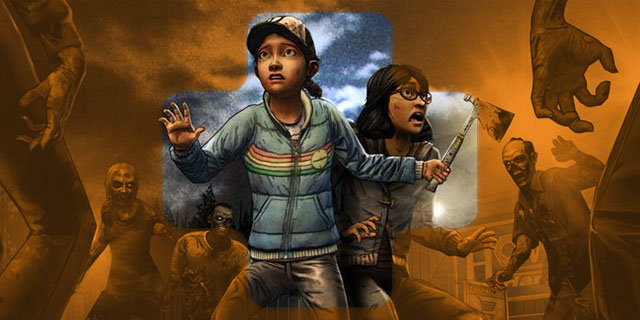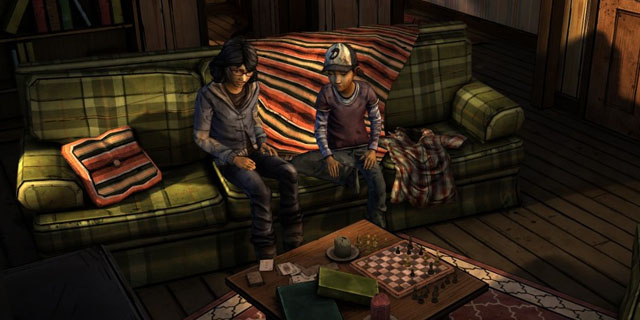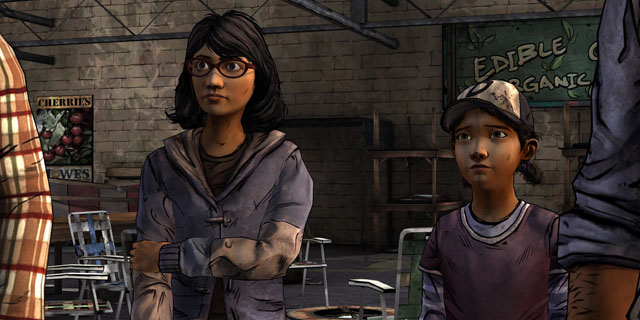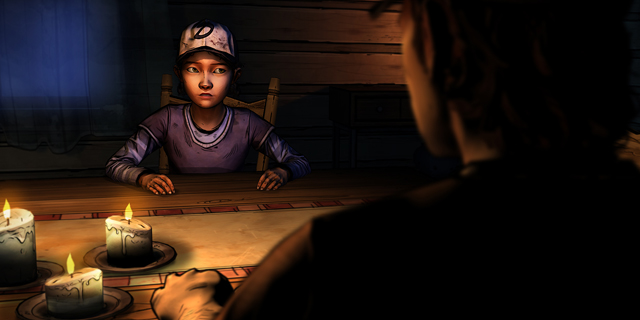
Editor’s note: The following contains spoilers for the second season of Telltale’s The Walking Dead.
I wrote about the first season of Telltale’s The Walking Dead a little more than a year ago, covering exactly why the choices in that game matter despite how little impact they might have on the overall story. It was a near-perfect execution of choice in games, simply because it didn’t throw in your face how “important” or “world-changing” your decisions were. Often, it would simply ignore them right before your very eyes. Despite that, those decisions still lingered, and turned just another zombie story into something unique.
It ultimately created a sense of trust between the writers and those who experience that story. Unfortunately, The Walking Dead: Season Two violates that trust in the worst ways possible.
The second season of The Walking Dead seemed to be heading in a spectacular direction. It introduced a terrifying villain, and continued to raise the stakes at every possible opportunity without being overbearing. It gave the player an opportunity to shape Clementine’s character and how she was able to adapt to a world without Lee, the person who essentially taught her how to fight on despite how difficult it seemed. It reintroduced one of the best characters from the first game, Kenny, and showed just how much past events impacted him in the long term. There was so much potential that was swiftly ruined in the fourth episode, Amid the Ruins.

Throughout the game, up to the fourth episode, you (possibly reluctantly) became friends with a girl named Sarah. Her father managed to shield her from the harsh world Clem was accustomed to, so Sarah’s naiveté and personality might have rubbed some players the wrong way. Despite that, I grew fond of her and opted to protect her, especially once her father was inevitably killed. Her character was perhaps the most tragic in the entire game; she lost the one person she depended on most. Unlike Clem, who dealt with a similar situation in the original, she didn’t have the strength to fight on. She was ready to give up entirely despite not really wanting to die.
In Episode Four, I had a choice to leave her behind, but I fought as hard as I could to convince her to keep going. Reluctantly, she accompanied Clem and the rest of the survivors; certain members of the group made it apparent she would only slow us down, however. It was clear she was emotionally broken, barely able to move on her own. I knew her chances of surviving were slim, but I thought what I was able to do for her would be enough, at least for now.
An hour later, in the very same episode, she was killed off in the most unceremonious way imaginable. Sure, that’s not uncommon in this series, but it felt like a stab in the back. Her name was never mentioned again. She was disposed of and never given a chance to even fight back. You could have tried to save her, but it would have been meaningless. This singular moment made me feel just how inevitable it all was. Yes, The Walking Dead games are all about this feeling, but the first season handled it so masterfully, with a few small exceptions, that this out-of-the-blue character death was handled as poorly as it could have been.

It didn’t help that it all happened because of a sudden, unexplained shift in behavior from one particular character, something that would be common in the rest of the game. It became less about crafting a story around well-written characters and more about writing a story and forcing the characters to be cogs in the game’s grand narrative. They meant nothing to the writers, even the ones, like Sarah, who were given plenty of chances to shine. Subtlety was thrown out of the window and all hope for a satisfying ending was lost.
The fifth episode, No Going Back, had some excellent character moments, giving me a chance to get closer to what was left of our ever-shrinking group of survivors. Once again, I was reminded of how well Season One handled somber moments, providing me with a brief glimmer of hope that all might be well despite the circumstances. I knew it wouldn’t be true, but the gesture was kind regardless. This was all well and good until two survivors went completely against their characters simply because the plot called for it. This leads the player down a frantic road towards the game’s brutal final moments.
In truth, the final choices in the game do impact the ending, making it the most dynamic moment in the entire series thus far. I genuinely enjoyed how Clem’s story ended, at least my version of it, but everything leading up to it left a bad taste in my mouth. The writers so clearly wanted those final moments to matter that they had to warp everything leading up to it just so it could work. In short, the choices that technically matter the most ended up not mattering at all. The man behind the curtain was exposed several hours ago, and now he was just mocking me.

The Walking Dead is all about expecting the unexpected. Tragedy could strike at any moment, but your choices should mean something. Maybe they mean nothing to the plot, but they certainly shape your interpretation of it. Season One managed to gracefully walk the line between the choices you felt were valid, even temporarily, and those that were invalidated immediately, yet still meant something. The second season did just the opposite of it, attempting to play the same tricks for shock value but failing to understand why they worked so well to begin with.
Sarah’s death signifies everything that’s wrong with how moral choices work in games. Instead of giving you a chance to feel like you were shaping a small part of an always expanding story, even if you knew deep down you weren’t, you were told — point blank — that your role in the narrative meant absolutely nothing. At a certain point, even your interpretation of Clem’s character fell by the wayside of the writers’ whims, giving you little reason to believe you would have any role to play in the rest of this disturbing tale.
Maybe that’s the point. Maybe the goal of The Walking Dead: Season Two was to make you feel even more meaningless in a world that was continuing to tear itself apart. In that case, Telltale completely succeeded. Unfortunately for them, I now know I don’t need to continue to experience their seemingly twisted version of what, at one time, seemed like a brilliant take on moral choice mechanics in games. Like the zombie-infested world Clementine inhabits, it simply became warped beyond recognition.



















